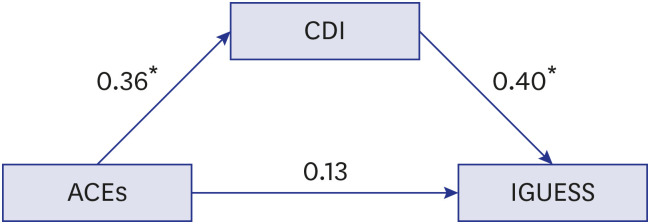J Korean Med Sci.
2020 Aug;35(31):e282. 10.3346/jkms.2020.35.e282.
The Mediating Effect of Depressive Symptoms on the Relationship between Adverse Childhood Experiences and Problematic Internet Use in Children and Adolescents
- Affiliations
-
- 1Department of Psychiatry, Gyeongsang National University Changwon Hospital, Changwon, Korea
- 2Department of Psychiatry, Gyeongsang National University College of Medicine, Jinju, Korea
- 3Department of Meditation Psychology, Nungin University, Hwaseong, Korea
- 4Department of Psychiatry, Eulji University Hospital, Eulji University School of Medicine, Seoul, Korea
- KMID: 2505200
- DOI: http://doi.org/10.3346/jkms.2020.35.e282
Abstract
- The purpose of this study was to evaluate the mediating effect of depressive symptoms on the relationship between adverse childhood experiences (ACEs) and problematic internet use. The study participants were 180 students between the ages of 9 and 18 years. Path analysis was performed to measure the relationships among ACEs, depressive symptoms and problematic internet use. ACEs significantly affected depressive symptoms (standardized regression weight, 0.36; P < 0.01), and depressive symptoms also affected problematic internet use (standardized regression weight, 0.40; P < 0.01). We found that depressive symptoms had a significant mediating effect on the relationship between problematic internet use and ACEs. The management of depressive symptoms would be important to prevent problematic internet use in children and adolescents with ACEs.
Figure
Reference
-
1. Chapman DP, Whitfield CL, Felitti VJ, Dube SR, Edwards VJ, Anda RF. Adverse childhood experiences and the risk of depressive disorders in adulthood. J Affect Disord. 2004; 82(2):217–225. PMID: 15488250.
Article2. Flaherty EG, Thompson R, Dubowitz H, Harvey EM, English DJ, Proctor LJ, et al. Adverse childhood experiences and child health in early adolescence. JAMA Pediatr. 2013; 167(7):622–629. PMID: 23645114.
Article3. Bellis MA, Lowey H, Leckenby N, Hughes K, Harrison D. Adverse childhood experiences: retrospective study to determine their impact on adult health behaviours and health outcomes in a UK population. J Public Health (Oxf). 2014; 36(1):81–91. PMID: 23587573.
Article4. Kessler RC, McLaughlin KA, Green JG, Gruber MJ, Sampson NA, Zaslavsky AM, et al. Childhood adversities and adult psychopathology in the WHO World Mental Health Surveys. Br J Psychiatry. 2010; 197(5):378–385. PMID: 21037215.
Article5. Schimmenti A, Bifulco A. Toward a better understanding of the relationship between childhood trauma and psychiatric disorders: measurement and impact on addictive behaviors. Psychiatry Investig. 2015; 12(3):415–416.
Article6. Schimmenti A, Passanisi A, Gervasi AM, Manzella S, Famà FI. Insecure attachment attitudes in the onset of problematic Internet use among late adolescents. Child Psychiatry Hum Dev. 2014; 45(5):588–595. PMID: 24338269.
Article7. Dalbudak E, Evren C, Aldemir S, Evren B. The severity of Internet addiction risk and its relationship with the severity of borderline personality features, childhood traumas, dissociative experiences, depression and anxiety symptoms among Turkish university students. Psychiatry Res. 2014; 219(3):577–582. PMID: 25023365.
Article8. Elhai JD, Dvorak RD, Levine JC, Hall BJ. Problematic smartphone use: a conceptual overview and systematic review of relations with anxiety and depression psychopathology. J Affect Disord. 2017; 207:251–259. PMID: 27736736.
Article9. Kim JH, Seo M, David P. Alleviating depression only to become problematic mobile phone users: Can face-to-face communication be the antidote? Comput Human Behav. 2015; 51:440–447.
Article10. Jo SJ, Yim HW, Lee HK, Lee HC, Choi JS, Baek KY. The Internet Game Use-Elicited Symptom Screen proved to be a valid tool for adolescents aged 10–19 years. Acta Paediatr. 2018; 107(3):511–516. PMID: 28940637.
Article11. Shin K, Kim D, Jung Y. Development of Korean Smart Phone Addiction Proneness Scale for Youth and Adults. Seoul: Korean National Information Society Agency;2011.12. Felitti VJ, Anda RF, Nordenberg D, Williamson DF, Spitz AM, Edwards V, et al. Relationship of childhood abuse and household dysfunction to many of the leading causes of death in adults: The Adverse Childhood Experiences (ACE) Study. Am J Prev Med. 2019; 56(6):774–786. PMID: 31104722.13. Saylor CF, Finch AJ Jr, Spirito A, Bennett B. The children's depression inventory: a systematic evaluation of psychometric properties. J Consult Clin Psychol. 1984; 52(6):955–967. PMID: 6520288.
Article14. Cho SC, Lee YS. Development of the Korean form of the Kovacs' Children's Depression Inventory. J Korean Neuropsychiatr Assoc. 1990; 29(4):943–956.15. Yen JY, Ko CH, Yen CF, Wu HY, Yang MJ. The comorbid psychiatric symptoms of Internet addiction: attention deficit and hyperactivity disorder (ADHD), depression, social phobia, and hostility. J Adolesc Health. 2007; 41(1):93–98. PMID: 17577539.
Article16. Yen JY, Ko CH, Yen CF, Chen SH, Chung WL, Chen CC. Psychiatric symptoms in adolescents with Internet addiction: comparison with substance use. Psychiatry Clin Neurosci. 2008; 62(1):9–16. PMID: 18289136.
Article17. Yang L, Sun L, Zhang Z, Sun Y, Wu H, Ye D. Internet addiction, adolescent depression, and the mediating role of life events: finding from a sample of Chinese adolescents. Int J Psychol. 2014; 49(5):342–347. PMID: 25178955.
Article
- Full Text Links
- Actions
-
Cited
- CITED
-
- Close
- Share
- Similar articles
-
- Mediating Effect of Resilience on the Association between Emotional Neglect and Depressive Symptoms
- Effects of Positive Psychological Resources on the Relationship Between Adverse Childhood Experiences and Depressive Symptoms in University Students
- The Relationship of Sexual Abuse with Self-Esteem, Depression, and Problematic Internet Use in Korean Adolescents
- The Effectiveness of Game Coding Education on Problematic Internet Gaming
- Relationship between Peer Relationships and Problematic Smartphone Use among Female Adolescents: The Mediating Effect of Depression


